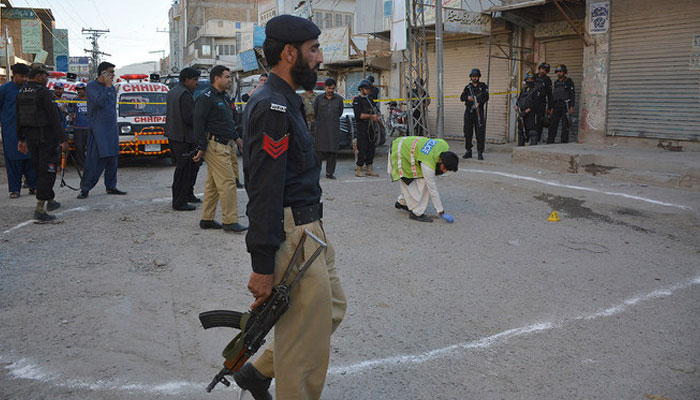Death of law
Problems with the Pakistani justice system run deeper than a dysfunctional system that routinely results in the miscarriage of justice
This was a bad week for rule of law in Pakistan, even by the country’s admittedly low standards. Once again, people have been reminded about how easily a single accusation can ruin and end lives, just how quickly an angry mob will form demanding blood, and just how easily authorities will either bend to this mob, stay out of its way or, in some cases, even act as executioner. The latter is what happened in Quetta on September 12 when a police constable killed a man accused of blasphemy while he was under custody. Then came the death of a doctor in Umerkot, Sindh, facing similar accusations as the accused in Quetta, last week – also at the hands of the police. Before the accused doctor was killed, there were violent protests in Umerkot, calling for strict action against the doctor. In the wake of the incident, the Sindh government has suspended the Mirpurkhas DIG police and SSP and other officials for mishandling the case and for an alleged fake encounter. It takes more than a uniform to make a police officer more than just another man with a gun and it appears to be becoming increasingly harder to distinguish the police from those they are meant to be policing in this country. Meanwhile, the previous week saw a Prevention of Electronic Crimes Act (PECA) Special Court judge sentence a Christian woman to death, inviting comparisons to the infamous Asia Bibi case.
Vigilantism and mob violence appear to have become so deeply embedded in the social fabric that even those charged with upholding the law can get caught up in reactionary bloodlust. This calls for a closer look into how exactly our police officers are trained and whether they have full understanding of the country’s laws before they are charged with enforcing them. It, of course, does not help that the police force is one of the most chronically underfunded, under-resourced and neglected institutions. As a result, the police in this country often have to bend or ignore the rules in order to get the job done. This creates a culture where undermining the law becomes a routine offence and the rules cease to command much value. However, it is not just the authorities that are used to ignoring the law in Pakistan. Faced with an outdated, backlogged system that rarely, if ever, delivers justice for ordinary people, there are those who have come to think that true justice requires acting outside the law. The inability of the authorities to help those seeking justice fosters the mentality that one must take matters into their own hands. These are the origins of mob or vigilante justice.
But the problems with the Pakistani justice system run deeper than a dysfunctional system that routinely results in the miscarriage of justice. This leads to a system rife with abuse and one that perpetuates social inequality by favouring the rich while disadvantaging the poor and minorities. When those supposed to be upholding the law are this broken, where exactly are people to go in order to find justice and protection?
-
 Bad Bunny Stunned Jennifer Grey So Much She Named Dog After Him
Bad Bunny Stunned Jennifer Grey So Much She Named Dog After Him -
 Kim Kardashian's Plans With Lewis Hamilton After Super Bowl Meet-up
Kim Kardashian's Plans With Lewis Hamilton After Super Bowl Meet-up -
 Prince William Traumatised By ‘bizarre Image’ Uncle Andrew Has Brought For Royals
Prince William Traumatised By ‘bizarre Image’ Uncle Andrew Has Brought For Royals -
 David Thewlis Gets Candid About Remus Lupin Fans In 'Harry Potter'
David Thewlis Gets Candid About Remus Lupin Fans In 'Harry Potter' -
 Cardi B And Stefon Diggs Spark Breakup Rumours After Super Bowl LX
Cardi B And Stefon Diggs Spark Breakup Rumours After Super Bowl LX -
 Alix Earle And Tom Brady’s Relationship Status Revealed After Cosy Super Bowl 2026 Outing
Alix Earle And Tom Brady’s Relationship Status Revealed After Cosy Super Bowl 2026 Outing -
 Why King Charles Has ‘no Choice’ Over Andrew Problem
Why King Charles Has ‘no Choice’ Over Andrew Problem -
 Shamed Andrew Wants ‘grand Coffin’ Despite Tainting Nation
Shamed Andrew Wants ‘grand Coffin’ Despite Tainting Nation -
 Keke Palmer Reveals How Motherhood Prepared Her For 'The Burbs' Role
Keke Palmer Reveals How Motherhood Prepared Her For 'The Burbs' Role -
 King Charles Charms Crowds During Lancashire Tour
King Charles Charms Crowds During Lancashire Tour -
 ‘Disgraced’ Andrew Still Has Power To Shake King Charles’ Reign: Expert
‘Disgraced’ Andrew Still Has Power To Shake King Charles’ Reign: Expert -
 Why Prince William Ground Breaking Saudi Tour Is Important
Why Prince William Ground Breaking Saudi Tour Is Important -
 AOC Blasts Jake Paul Over Bad Bunny Slight: 'He Makes You Look Small'
AOC Blasts Jake Paul Over Bad Bunny Slight: 'He Makes You Look Small' -
 At Least 53 Dead After Migrant Boat Capsizes Off Libya
At Least 53 Dead After Migrant Boat Capsizes Off Libya -
 'God Of War' Announces Casting Major Key Role In Prime Video Show
'God Of War' Announces Casting Major Key Role In Prime Video Show -
 Real Reason Prince William, Kate Broke Silence On Andrew Scandal Revealed
Real Reason Prince William, Kate Broke Silence On Andrew Scandal Revealed




